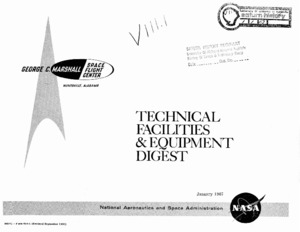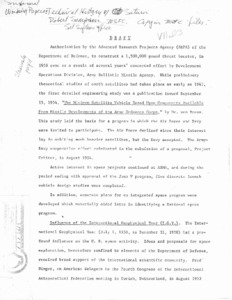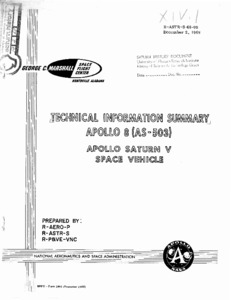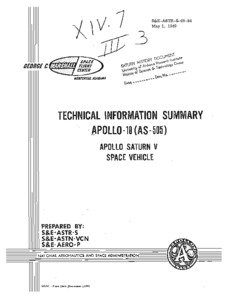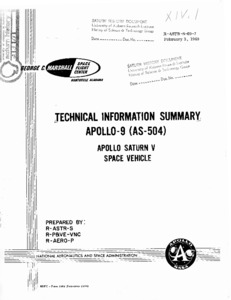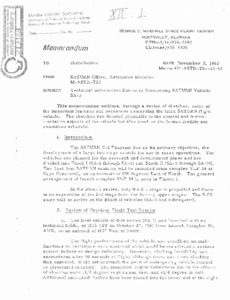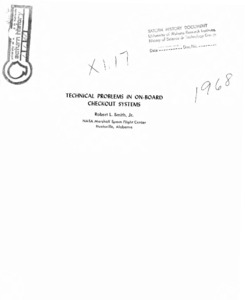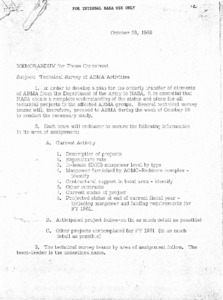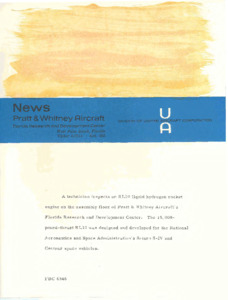
Browse Items (970 total)
Sort by:
-
"Technical facilities & equipment digest."
This document portrays the capability of technical facilities and equipment at the George C, Marshall Space Flight Center (MSFC) , one of three basic field centers under the NASA Office of Manned Space Flight. -
"Technical History of Saturn."
Draft of working paper. Typed with handwritten notes (title and author) and pages. Copy in MSFC files noted on first page. -
"Technical Information Summary Apollo 8 (AS-503) Apollo Saturn V Space Vehicle."
This document is prepared jointly by the Marshall Space Flight Center laboratories R-AERO-P, R-ASTR -S, and R-P&VE-VN . The document presents a brief and concise description of the AS-503 Apollo Saturn Space Vehicle. Where necessary, for clarification, additional related information has been included. It is not the intent of this document to completely define the Space Vehicle or its systems and subsystems in detail. The information presented herein, by text and sketches, describes launch preparation activities, launch facilities, and the space vehicle. This information permits the reader to follow the space vehicle sequence of events beginning a few hours prior to liftoff to its journey into space. -
"Technical information summary Apollo-10 (AS-505) Apollo Saturn V space vehicle."
The document presents a brief and concise description of the AS-505 Apollo Saturn Space Vehicle. Where necessary, for clarification, additional related information has been included. -
"Technical Information Summary Apollo-9 (AS-504) Apollo Saturn V Space Vehicle."
The document presents a brief and concise description of the Apollo 9 Saturn Space Vehicle. -
"Technical information summary concerning Saturn vehicle SA-3."
This memorandum outlines, through a series of sketches, some of the important features and sequences concerning the third SATURN flight vehicle. The sketches are devoted primarily to the control and instrumentation aspects of the vehicle but also touch on the launch facility and countdown schedule. -
"Technical information summary concerning Saturn vehicle SA-3."
This memorandum outlines, through a series of sketches, some of the important features and sequences concerning the third SATURN flight vehicle. The sketches are devoted primarily to the control and instrumentation aspects of the vehicle but also touch on the launch facility and countdown schedule. -
"Technical problems in on-board checkout systems."
For the purposes of this paper, an onboard checkout system is defined as a system which is built into prime flight equipment, flies with it, and permits a checkout capability to exist during all the major phases of the test and mission life of that prime equipment. Varying degrees of capability may exist in such a system, depending on what is designed into it. This, in turn, is generally dependant on life and mission requirements of the prime equipment, degree of mission checkout required, reliability restrictions,redundancy levels, data management scheme, and equally important, state of the art . Not all checkout can be accomplished with onboard equipment. Mechanical system problems such as leak detection, for example, require techniques that cannot be remotely controlled and evaluated today. On the other hand, such things as in-flight telemetry have been used for quite a long time and will continue to be used for onboard checkout. -
"Technical survey of ABMA activities."
Handwritten notes on the document.; Archive copy is a poor photocopy. -
"Technician inspects an RL10 liquid hydrogen engine."
A technician inspects an RLlO liquid hydrogen rocket engine OD the assembly floor. of Pratt & Whitney Aircraft's Florida Research and Development Center. The 115,000-pound-thrust RLlO was designed and developed for the National Aeronautics and Space Administration's Saturn S-IV azld Centaur space vehicles.
